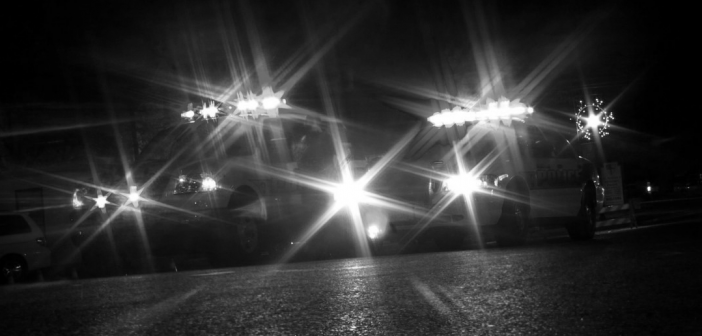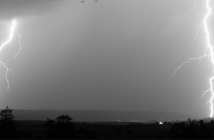The baby cries below me. The sound finds its way through tiny cracks in the floor, like gas. The mother’s singing to it now, but I can’t hear the words. She was already renting the ground floor when my mom and me sold our house and moved into the upper floor a year ago. Mom’s gone to bed already, hopefully the baby won’t wake her.
My window is open, the rolled joint on my dresser. I poke my head into the cool darkness and peer down our two-block street. Two houses have lights on, but otherwise Queen Street is dead. Even in the dark, I can see all the way down in both directions, to the abandoned fire station where it T’s off at Tioga, and the other way where the street meets a dirt hill just below the gutted Ithaca Gun factory. The houses are packed onto Queen Street, and they just barely fit. The driveway to our house is too narrow to pull in smoothly, your back tire rolls up and over the curb like the tread of a tank. I say our house, but of course it isn’t. Before, we had a washer/dryer. Now my mother bitches because she has to wash her clothes in the laundromat around the block. She hates the neighbors seeing her in public with her laundry basket full of clothes, says it makes her look like a homeless person. I told her to take it at night, but she’s scared to go outside after dark, even though I’ve offered to walk her.
The baby’s still crying. I step out to the porch roof below my window. The shingles are rough, and the ground below looks just close enough to make one think seriously about jumping. I’m searching my pockets for a lighter, when sirens wail behind me, and I see a man–black–bolt around the corner of Tioga onto our street, sneakers socking the pavement. He pulls up short at the hedge next to our house, his breath like groaning, and he step into the pruned barrier until his body is surrounded by it. Then he ducks as if going down a trap door, disappearing beneath the ragged hedge except for the top of his afro.
Sirens louder. I climb back into my room as the cops pull up. Cruisers wash red across the neighborhood, pushing along the walls in my room like a shadowed carousel. The lights in Sonia Marshall’s house come on. Now Peggy Brown’s from across the street. There’s two more cop cars, but when they turn onto Queen they have to slow down. Four cop doors open simultaneously. They walk four straight lines converging on one point. I hear one officer’s laugh, pointing at the crest of hair still visible above the hedge. They pull him out, and he emerges limp and sagging, two arms hanging over the shoulders of an officer on each side of him. The porch light directly across the street comes on, and Rick Dermont walks out in his terry cloth bathrobe, a bony triangle of skin bared across his chest.
The man sits on the curb. One of the officers leans over him, arms crossed, looking down at the dark body slumped over. The man nods, the cop nods, then the man shakes his head, the cop still nodding, like both of them are attached with an invisible pulley, controlling each other. Back and forth. It looked choreographed somehow, and I thought of my father. He would have something to say about this, if he were still in town. My dad had lots of stories about the police because he used to live in Brooklyn years ago, before we moved to Ithaca. He once told me how he saw a cop yank a guy out of his seat, right through the open driver’s side window, just for giving him lip. He said that cops don’t like to have people watch when they’re making an arrest. I guess that didn’t matter here.
“Your pockets,” the cop says. The man stands up and produces two white saddle bags at the sides of his pants. White scraps and small objects trickle to the ground. Two officers, flashlights pointing down, begin sifting through the grass. They find something, crowding around the object, shine their flashlights on it, except for one, who grabs the man by the neck and drags him over to a squad car. He’s forced against the side window and cuffed. He grunts loudly and begins to curse. More lights come on from houses further down the block.
“Ben, what’s going on there?” The question comes, strained and tired, from my mom’s bedroom. She goes to bed early and wakes up even earlier. It was different when my dad was around, because they always argued at night. My mother said she was ashamed to look her neighbors in the face. But that was when we owned a house instead of renting half of one. When we were separated from our neighbors by yards and trees instead of driveways and flower beds.
I walk into the hall and stand by my mother’s door. “Mom, were you asleep?”
A sigh comes from inside. Bed sheets rustle. “What’s going on out there? Is it an ambulance?”
“No Mom, it’s just the cops.”
Her feet scratch the rug, she’s out of bed. “The police? My God, is everything all right?”
“It’s okay, Mom,” I say. “They just arrested some guy, that’s all.”
“Arrested someone? For what?”
“I don’t know.” Then I add, “Maybe cocaine.”
After a pause there’s the sound of broken breath that takes me a second to figure out whether it’s laughter or sobbing. But only a second. “This is the neighborhood we live in,” she says. She keeps repeating it to herself over and over, faster, then higher, like she’s discovering something new each time she says it. I try to think of something comforting to tell her, but can’t think of anything because as far as I can see there’s nothing bad about our neighborhood. Sonia Marshall is an architect and Rick Dermont’s a Cornell professor. If anything, there’s too much tidiness. Houses bunched in neat rows like soda cans yolked together by those clear plastic rings. Neighborhood meetings are called over one garbage-pillaging raccoon. Everything is so in place that it’s almost a dare: do something crazy, the silent tidiness says, people will look. I realize my hands have curled into fists and unclench them.
“Mom, it’s not that bad.”
A long sniff makes its way through the door. “There was a woman mugged two blocks down less than a month ago. And last week someone stole my clothes basket at the laundromat. I left it there with the load running, and when I came back it was gone.
“Mom, that mugging was three months ago.”
“What about my clothes basket?”
“Maybe someone just thought it was theirs.”
“I don’t think so. That basket cost fifteen dollars, and I got it especially for someone my size.” My mother is five feet tall and weighs less than a hundred pounds. She complains a lot about how hard it is to find things for “someone my size,” as though her smallness is not her, but a stranger she is trapped within. I think whoever took her clothes basket did so by accident.
Shouts come from outside. A flashlight’s beam sweeps wildly through the kitchen window.
“My God, what’s going on out there?” Her light is on and the door is thrown back. Her hair is tangled and eyes squinted. “Ben, I can’t sleep with all this noise, and it’s driving me crazy! You said the cops are arresting someone. Did you make sure to lock the door?”
“Mom, go back to sleep, I’m sure everything will be fine.”
“Answer my question: did you or did you not lock the door before you went to bed?”
“I don’t remember, Mom.” This is not good enough. She moves past me, and I grab her in a bear hug, holding her back as she tries to get to the front door.
“Benjamin, let go of me!” Her elbows knock my ribs as she struggles to wriggle free, and I keep holding her in spite of myself. Don’t let her win.
When I do release her we are both panting. Violence shakes the air around us, our arms slash through the pale hallway light. She’s shaking her finger in my face, and I’m trying not to grab that too.
“Don’t ever do that again,” she says. “The police should be here to protect me from you.”
What can I say to this? Words sag in my throat like old butter, and I just keep swallowing and blinking, swallowing and blinking. “I was trying to help you,” I say, finally, but I wonder if this is true.
“Well, you made things worse.” She has no clue, no clue at all the things I could say to hurt her. “I know what you think,” she continues. “That I’m old and pathetic and don’t know how to live properly.” She’s looking at my chest as she says this.
“C’mon Mom, I didn’t say that.” But her words make me feel naked; she can read my thoughts. I bend in and pull her close to me. She’s small, and her spine is like a string of beads. My chin rests on top of her head.
“All our neighbors can hear us fight,” she says.
Police men never look comfortable indoors. Their heavy steps shake the floor, the bulky assortment of gadgets swishing around their waists seem ready to scratch paint from walls, dent furniture, billy clubs and gun holsters knocking over vases and chairs as they swing from side to side.
The first time the neighbors called. My mom had thrown one of my building blocks in the living room and hit my dad in the head. He roared with pain and leapt off the couch like a rabid animal, chased my mother up the stairs and pounded on her locked door. That was the first time the cops had come.
The other time was just before he left. It was after midnight when their shouting woke me up. The rhythm of their argument was hypnotizing. The steady escalation of voices. Footsteps and silence. Pursuit. I lay there for a long time, feeling hidden and helpless and safe. Their shouting grew.
But then there was silence again, stretching blindly forward so that eventually I began to hear the sinister hum of the electrical box outside my window. A few minutes later, rubber tires crunched up our driveway. The gun shot of a closed car door.
“You actually did it,” my father said. “Jesus Christ. This will be great. Absolutely fucking great.”
Our doorbell’s high falsetto. Bah-duh.
I crept out of my room and waited by the stairs. I didn’t see the door open, but for some reason have this strange image of my parents answering the door together. Sharing their shame. Three weeks later my dad rented a truck, took his things and left. Three months after that my mom sold the house, and we had to rent a truck too. I didn’t hear from my dad for awhile, but he called recently to tell me he’s moved back to Brooklyn.
The light in my mother’s room has gone dark. It’s past ten. I could go to bed. But instead, I crawl out the window onto my little roof with the joint behind my ear. Some neighbors are still out. They stand under Peggy Brown’s screen porch across the street and speak in low voices. The cruisers are gone, painting the night red with their sirens, gone with the man cuffed and bruised, leaving only scraps from his pockets on the ground. I sit down to wait, roof shingles sandy under my bare feet.
This is my favorite spot to be. I can look down at the cars, bumper to bumper on both curbs, appearing lonely and homeless in the open street. When people walk past I can stare them down and they have no idea. Everything seems to move blindly, according to program. The tops of heads that bob, their feet beneath stepping briskly across sidewalk cracks. The cars that turn down this small street, lost, trying to get back downtown. Even the squirrels that play hide and seek in the trees and climb under neighbors’ porches. If you give them time their bushy heads will re-appear seeking light and open space. It can all be predicted. Except you. You are outside all of it. Above it. Everything can seem innocent and stupid and helpless and you can look down and say, I’m not a part of that, I’m up here and it’s different now.
Peggy Block, her husband, Rick Dermont and Sonia Marshall are still talking, comparing notes, debating social action. They have neighborhood watch committees, meetings about where to plant trees along the sidewalk. There is a plan to landmark the fire station. I’m starting to get antsy, because I can’t light this joint until they leave. They’ll smell it sure as shit, start looking around and see me.
“Hey guys,” I call out. Their heads turn, but they can’t see a thing because their porch light is on.
“Who is that?” Sonia Marshall calls.
I say my name. “Why did they arrest that guy?” I ask.
They’re still confused, not realizing I’m on the roof. They squint and shield their eyes, and I can’t help but laugh because they’re still looking along the sidewalk, on their neighbors’ porches, like these are the only the places people can exist.
“Up here,” I say, and they step out of the light to see me.
The man fought with the police and tried to escape. It was not drugs on the ground, as it turned out, but a necklace. He had robbed a woman nearby walking home in the dark. Rick Dermont tells me this.
“It’s all from that housing complex on Lincoln Avenue. They come here to do their laundry,” Sonia Marshall says. She points to the glowing laundromat window at the end of the block, still open.
“My mother does her laundry there,” I say. “Someone stole her clothes basket.”
Nobody responds. Below me I hear footsteps, the baby crying.
Sonia finally says, “Well, tell your mother to be careful.” She puts her hands together and bows a little, almost like she’s praying. “We’re going to have a meeting this Tuesday. Tell her to come.”
I say okay, and then there’s more silence, which is good. Now that they know I’m out here, they don’t feel comfortable talking anymore. They say goodnight to one another, wave to me, and head for their doors.
“How long are you going to stay up there?” Sonia says.
I look down at her and shrug. She probably can’t see it in the dark. After a few seconds, she shakes her head and goes inside too.
The smoke singes my lungs, a little spicy, but I hold it in, letting the air inside me become a kind of static that carries to the tips of my arms and up behind my eyes. I feel the porch below me empty and hollow, like an air bubble that I’m sitting on top of. The other day my mother left for work and couldn’t get the door closed. The lock is tricky, you have to pull while you’re turning the knob, and the key needs to be a little out of the lock. I couldn’t see because my roof is right over the porch, but I could hear the door thumping as she opened and closed it, then her key scratching the lock while she cursed under her breath. Her curses became louder, the door slammed, and I felt her scream in the shingles where my elbows were resting. At that moment, I wanted to jump down and help her. I wanted to climb out the window, lean over the edge and tell her that it was going to be okay. But my mother doesn’t know about me going on the roof. If she did, she would flip. So I closed the window instead. It’s easy to want to help someone when you’re safely out of reach. There were other things I could have done to help her, simpler things. I could have just walked down the stairs and told her that I’d lock the door after her. But that felt even more dangerous than jumping off my roof, like if I got too close to her in that moment she would suck me right through the keyhole and into her despair.
My dad called me last Saturday, late morning, when my mother always takes a walk if it’s nice out. He knew she wouldn’t be there. He told me that he had rented an apartment with an extra bedroom and that he wanted to see me soon. He said he was making good money, and that I could come live with him, if I felt like it.
I could leave tonight. I wouldn’t need much, just a duffel bag with some clothes, a few books, some money and my weed. There’s an envelope in my underwear drawer with $150 in it (from a carpentry job I helped out with a few weekends ago) and more in my account. The bus station’s less than a fifteen minute walk from here, and the last bus to New York City doesn’t leave until one. The joint has been burning in my fingers, untouched. I finish it and picture the city, its grime and mess, everyone rubbing shoulders in the subway, no one giving a shit. That’s where I belong. Not here, where one guy hiding in a hedge gets the whole block flustered, where you’re expected to keep all your pain and mess inside the four walls you call home. Go to sleep, I tell myself. You’re stoned. Get off this roof before you start thinking that you can flap your arms and fly. But inside it’s worse. My room is a cramped cell. I need water, but I don’t want to go into the kitchen and risk waking my mother up.
Then I hear her, a wordless shriek, and she cries out, “No! I won’t!” terror muffled through the door, like a hand over her mouth. My heart is racing, waiting for her to scream again, the demons in her sleep returning for more. After a minute the air begins to softens, but I’m still here, trapped in my room.
I flip the light on and pull a duffel bag from my closet. Shirts, pants, underwear, socks. The envelope from my dresser is fat with bills. My toiletries are in the bathroom, but I don’t need them. I can get more when I get to the city. All that remains is my mother, something to explain my absence tomorrow when she wakes up. I start to picture it and feel sick: she will crumple to the floor and lie there sobbing. She will ask God to take her from the earth. No, I can’t think about that. I can’t save her. She will get up. I won’t be dead, she’ll see me again. On a piece of lined paper, I write: Mom, had to leave here for a bit. Staying at Dad’s. Call you when I get to Brooklyn. Love, Ben. I hold my pen above the paper, feeling numb, then write, P.S., but can’t think of anything else to add so I cross it out.
My duffel bag lands on the grass in front of our house with a soft whoomp. I climb to the edge of the roof and ease my legs over. The ground looks dark and crater-like below my feet. It’s not that far. I’ve seen kids at my school jump bigger drops and be fine, but something inside me doesn’t want to. My duffel bag lies there, a lump on the grass waiting to be rescued. I push off without thinking and land hard, the ground quaking through my ankles and shins, forcing me to my knees with a grunt. I stay there for a moment before standing. My feet are tender, but the pain subsides after walking around the yard a few times. My mother’s bedroom window is still dark. I check my watch: the last bus leaves in a half hour. I’m reaching down to pick my bag up, when the door unlocks behind me. It creaks open and I cringe, ready for her scream to scatter me in pieces across the yard.
“Hello, are you okay?” The voice is soft and concerned. A gurgling, plaintive murmur echoes her question. She is in her twenties, with a round face and long brown hair brushed over her shoulders so that it runs down her sides like two waterfalls. I think I’ve only seen her two or three times. We’ve never spoken, but I know from my mother, who has spoken to her, that she works as a home secretary for a professor at Cornell. She stands on the porch barefoot, cradling the baby.
I look at the bag in my hands and back at her. “Did I wake you up?” My voice is a frog’s croak, echoing across our yard.
She rocks the baby a few times. “We were up already. I heard a noise outside and wanted to make sure everything was okay.” She looks at my bag. “Are you running away?”
I look at her, then at the baby, whose hands I can see wriggling up to touch his mother’s breasts. “I don’t know,” I say. “I wanted to see my Dad.”
The baby gurgles. His face is partly visible, looking past his mother, and I realize that his hands aren’t reaching up to touch her breasts.
“His father is in Minnesota,” she says, nodding down to her arms.
“He’s beautiful,” I say.
“Would you like to hold him?” She steps off the porch, and he cranes toward me. I stroke his forehead with my palm, its curve fragile, skin warm and soft. I do want to hold him, but I’m also afraid because he’s seems so helpless, lying there against his mother’s belly, this tiny wriggling creature.
“I don’t want to drop him,” I say.
“You should probably take your bag off.”
I pull it from my neck and drop it to the ground. She shows me how to hold him so that he’s secure, so that he lays in the crook of my arm while my hand holds his bottom. She lifts him toward me, and I’m almost trembling, but I get him in my arms so he’s secure against my side. He starts crying a little, his chest forcing out shaky breath. I bring him up to my shoulder and rock him there, feeling the air from his mouth against my neck.
“It’s okay,” I whisper in his ear, and his heart beats on my shoulder, an urgent, blinking warmth.
(Originally published in . Reprinted with permission of the author).




